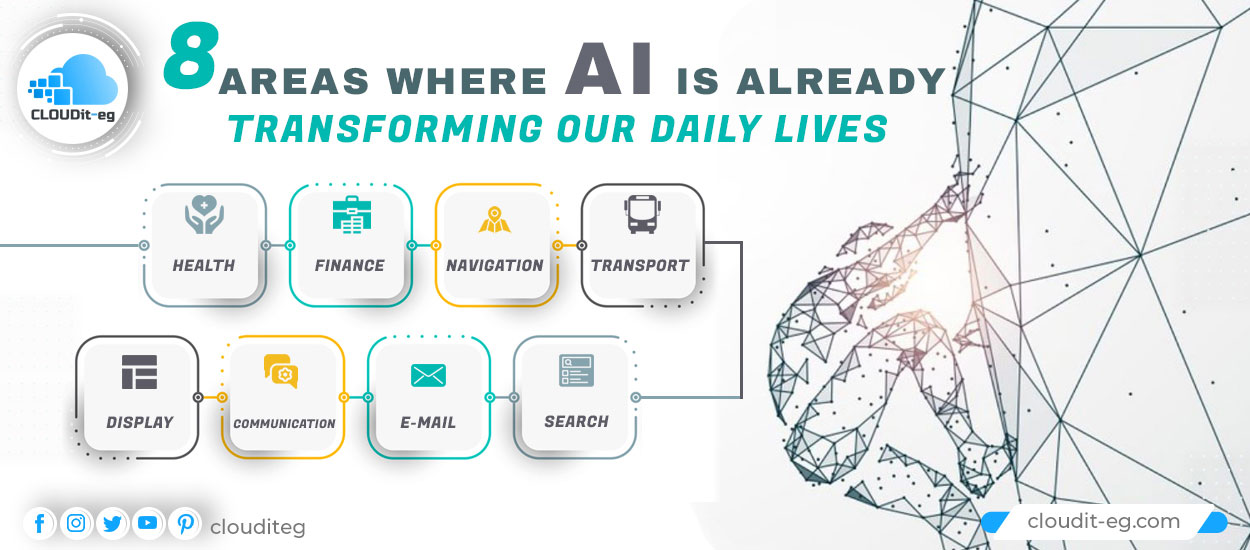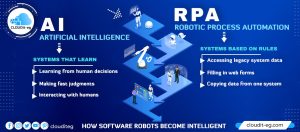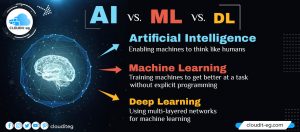Much more than just a fad, Artificial Intelligence is now more than ever part of our everyday life. Whether you’re checking emails or binge-watcher ahead of Netflix, AI makes decisions for the only purpose of personalizing the experience supported by individual preferences, habits, and behaviors.
From healthcare to search, communication, and transport, many sectors are benefiting from the innovative power of AI. Discover how technology is transfiguring our daily lives through this quick overview of the different fields of application of AI.
1. Transport
It’s no secret that AI is at the heart of the mobility of the future. Autonomous vehicles adapt to a multitude of situations. Not only do they reduce the risk of human error at the wheel, but they automatically integrate the preferences of their driver, for example by activating the heated seats in winter. Safety, yes, but also comfort!
2. Navigation
Many navigation apps rely on AI to assess the traffic situation in real-time, identify possible danger zones (accidents, roadworks, speed cameras), and calculate the fastest route.
These factors are taken into account with each new route search … and it also works for carpooling services.
3. Finance
More resistant to change, financial institutions will favor AI technologies to meet the needs of their customers in terms of personalization, especially when it comes to investment plans. Many banks are using AI to personalize their communications and customer experience on mobile.
For example, Wells Fargo analyzes customer account information to identify recurring payments and understand their use of services. The goal? Offer personalized features such as payment reminders, overdraft alerts, and transfer notifications.
4. Health
Derived from AI, machine learning plays a key role in treating illnesses and improving doctor-patient interactions.
Technology now makes it possible to locate a tumor in a medical image and to establish a diagnosis based on a pathological report. More accurate than manual symptom detection, AI is revolutionizing the industry. Chatbots (which help to better understand patient symptoms) and facial recognition software are now combined with deep learning to detect rare genetic diseases.
5. Search
Search engines are also fully exploiting the benefits of AI: technology makes it possible to better understand user behaviors and generate better results, for brands and Internet users alike.
A search engine will understand, for example, after a few minutes of navigation, that the term “Dauphin’s Nice” searched for refers to the American football team “Dauphin’s Nice”, and not to the marine mammal. More intuitive, search engines not only save users time but also advertisers to serve relevant ads (we tell you more in this article, a little below).
6. E-mail
Like search, email has taken advantage of the advantages of machine learning and artificial intelligence. If Google today uses AI, it is to deploy multiple features, including spam detection, and protect inboxes. The messages are automatically sorted and placed in the categories “Main”, “Social networks”, “Promotions”, “Updates”, “Spam”, …
Gmail also relies on artificial intelligence to create suggested responses and smart notifications. Almost all email providers make it easy to identify the most important communications.
Users don’t even have to type their messages anymore. One-click response suggestions have become commonplace. And if that weren’t enough, internet users also have the option of activating smart reminders to respond to the most important messages. What more?
7. Communication
Voice function is part of our daily lives, from smart speakers to in-car controls. Machine learning systems are increasingly able to understand and interact with humans. Some natural language processing (NLP) applications now integrate machine translation, speech recognition, and sentiment analysis functions.
Voice-activated devices are fundamentally based on AI, which is destined to further transform our daily interactions. Ditto for call centers that are increasingly using AI and machine learning to simplify the processing of customer service requests.
8. Display
Thanks to AI, companies now process large volumes of customer data to create innovative and ultra-relevant ads, which adapt to each step of the shopper’s journey, according to their behaviors, purchasing habits, and preferences…
AI makes it possible, for example, to analyze the browsing behavior of a young owner and present them with the most useful ads, from renting a van for their move to buying furniture and items. deco.
Conclusion:
already present on a daily basis, AI will only develop, increasingly influencing our decisions and our interactions with brands.




